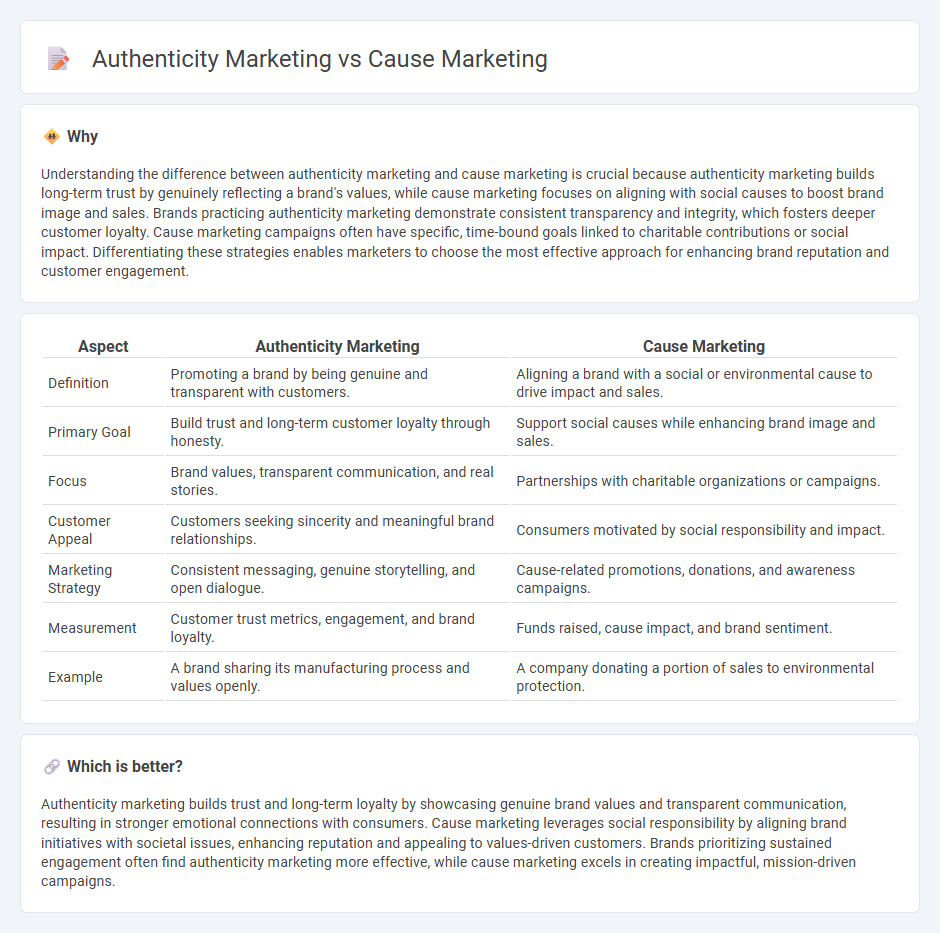
Authenticity marketing focuses on building trust by transparently showcasing a brand's genuine values and personality, while cause marketing aligns a brand with social or environmental issues to drive positive change and consumer engagement. Both strategies leverage emotional connections but differ in motivation, with authenticity centered on truthfulness and cause marketing on advocacy. Discover how these distinct approaches influence customer loyalty and brand perception.
Why it is important
Understanding the difference between authenticity marketing and cause marketing is crucial because authenticity marketing builds long-term trust by genuinely reflecting a brand's values, while cause marketing focuses on aligning with social causes to boost brand image and sales. Brands practicing authenticity marketing demonstrate consistent transparency and integrity, which fosters deeper customer loyalty. Cause marketing campaigns often have specific, time-bound goals linked to charitable contributions or social impact. Differentiating these strategies enables marketers to choose the most effective approach for enhancing brand reputation and customer engagement.
Comparison Table
| Aspect | Authenticity Marketing | Cause Marketing |
|---|---|---|
| Definition | Promoting a brand by being genuine and transparent with customers. | Aligning a brand with a social or environmental cause to drive impact and sales. |
| Primary Goal | Build trust and long-term customer loyalty through honesty. | Support social causes while enhancing brand image and sales. |
| Focus | Brand values, transparent communication, and real stories. | Partnerships with charitable organizations or campaigns. |
| Customer Appeal | Customers seeking sincerity and meaningful brand relationships. | Consumers motivated by social responsibility and impact. |
| Marketing Strategy | Consistent messaging, genuine storytelling, and open dialogue. | Cause-related promotions, donations, and awareness campaigns. |
| Measurement | Customer trust metrics, engagement, and brand loyalty. | Funds raised, cause impact, and brand sentiment. |
| Example | A brand sharing its manufacturing process and values openly. | A company donating a portion of sales to environmental protection. |
Which is better?
Authenticity marketing builds trust and long-term loyalty by showcasing genuine brand values and transparent communication, resulting in stronger emotional connections with consumers. Cause marketing leverages social responsibility by aligning brand initiatives with societal issues, enhancing reputation and appealing to values-driven customers. Brands prioritizing sustained engagement often find authenticity marketing more effective, while cause marketing excels in creating impactful, mission-driven campaigns.
Connection
Authenticity marketing and cause marketing are interconnected through their shared emphasis on genuine brand values that resonate with consumer beliefs. Authenticity marketing builds trust by promoting transparency and honest storytelling, while cause marketing aligns brands with social or environmental causes that reflect these core values. Together, they enhance brand loyalty by fostering emotional connections grounded in sincere commitment to meaningful initiatives.
Key Terms
**Cause Marketing:**
Cause marketing integrates nonprofit causes with commercial brands to drive social impact and enhance brand loyalty by aligning company values with customer concerns. Campaigns often leverage partnerships with charitable organizations, promoting donations, awareness, or action that resonates emotionally with consumers. Discover how cause marketing can elevate your brand's purpose and consumer connection.
Social Responsibility
Cause marketing emphasizes partnerships between brands and nonprofit organizations to promote social causes, driving consumer engagement through shared values. Authenticity marketing focuses on genuine brand transparency and consistent actions reflecting social responsibility, fostering trust and long-term loyalty. Explore how integrating both strategies can enhance your social responsibility efforts and build a credible brand image.
Brand Alliance
Cause marketing leverages partnerships between brands and social causes to enhance corporate social responsibility and consumer engagement, often driving increased brand loyalty through shared values. Authenticity marketing emphasizes genuine, transparent communication of a brand's true mission and values, fostering deeper trust by avoiding superficial or purely promotional collaborations. Explore how brand alliances can effectively balance cause marketing and authenticity marketing to build credible, resonant consumer relationships.
Source and External Links
How Brands Are Driving $2B+ in Social Impact (2025 Playbook) - Cause marketing creates mutually beneficial partnerships between for-profit businesses and nonprofit organizations, using promotional campaigns that support social and environmental causes while enhancing brand value and consumer loyalty, with the industry growing to over $2 billion in impact.
What is Cause Marketing? | University of Phoenix - Cause marketing is a strategic collaboration between companies and nonprofits aimed at benefiting both while increasing brand awareness, trust, and customer engagement, driven by consumer demand for corporate social responsibility in purchasing decisions.
What is Cause Marketing? | Mailchimp - Cause marketing involves business-nonprofit partnerships addressing social or environmental issues, enhancing corporate social responsibility and appealing to consumers who expect brands to act ethically and sustainably.
 dowidth.com
dowidth.com